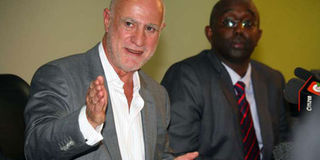Government should give governance of Kenya Airways back to board

Michael Joseph (left), a member of Kenya Airways' board, and Paul Gichinga, the secretary-general of Kenya Airlines Pilots Association, at Kenyatta International Convention Centre in Nairobi on October 17, 2016. PHOTO | EVANS HABIL | NATION MEDIA GROUP
What you need to know:
- We have a Cabinet committee on Kenya Airways comprising Cabinet Secretaries.
- And we have a technical committee of the Cabinet committee that has more bureaucrats.
The government should scrap all these committees and transfer all decision-making to a board composed of individuals with the mind-set of working in the best interests of Kenya Airways instead of a board that functions as a conveyor belt for decisions made elsewhere by political appointees and cronies.
Mr Michael Joseph was appointed as a board member hardly two weeks ago. He was only days old in that position when he was given the responsibility of leading negotiations that finally led to the lifting of the strike notice by Kenya Airways pilots.
Where principles of good corporate governance are observed, you will not find a case where a single director who has not sat on the board long getting involved in negotiating with a union.
Clearly, the signal the government wants to send out is that Mr Joseph is not going to be your usual namby-pamby chairman of Kenya Airways. An insider whispered to me this week that Mr Joseph is more or less going to operate as an executive chairman.
The chairman of Toyota Tsusho Eastern Africa and respected corporate executive, Mr Dennis Awori, will officially step down on Wednesday both as chairman of the company and director. I also gather that the CEO, Mr Ngunze Mbuvi, will also be leaving the company in a matter of months.
By the way, the decision to let the duo go was negotiated long before the pilots called their strike to demand their removal from office. Which is why I still do not understand why there seemed to be a sense of urgency to remove Awori and Mbuvi when it was clear that an agreement with the government to have them exit had already been reached.
From the intelligence I am able to gather and from discussions with insiders, it appears to me that the battle to influence the fate of Kenya Airways involved powerful forces in the Jubilee administration, each with its own vested interests.
PLANTED ALLIES
The powerful figures, including former executives who were forced out of the company, appear to have planted allies within the board, the bureaucracy of the airline, and even the pilots’ union.
The board had been rendered ineffective by constant disagreements. Major sources of conflict within the board include the fate of the joint venture with KLM, the sale of the Heathrow landing slots, allegations that elements within the board were still loyal to some of the top executives who had been sacked, and claims that some of the directors were involved in leaking documents to the press.
The manner in which the parties approached negotiations with the pilots’ union was a reflection of the behind-the-scenes manoeuvres by the power-hungry elite.
Initially, Cabinet Secretary James Macharia rightly insisted that he would not sit at a table with the pilot’s union to discuss an issue that had nothing to do with workplace issues, namely, demands that Mr Awori and Mr Mbuvi leave office. He later made an about-turn about this. Yet from an industrial relations standpoint, the government took a risky gamble in agreeing to sit with the pilots. The signal sent out is that the views of trade unions must be accommodated even when they introduce grievances that are outside workplace issues.
The pilots’ union has now smelt blood. It might now decide to keep its members away if the shareholder’s deal with KLM is not revoked immediately or if the contract with the consultancy firm, McKinsey, is not scrapped.
NOT SURPRISING
It is not surprising that the pilots were more than willing to donate workplace muscle to contracted cabin crew who do not even have a collective bargaining agreement with Kenya Airways. They were boycotting work while wearing the airline’s uniforms.
Mr Joseph has solid credentials, especially as a start-up artist and tough manager, but he is not famous for union-busting tactics. He will be taking over a company that has let go many of its top executives within a very short time — the commercial director, the finance director, the human resources director, and soon the CEO. So, where is institutional memory?
Now that the process of restructuring the board is complete, the government must do the following.
First, it should give the governance of the company back to the board. Currently, the governance is shared among too many entities. We have a Cabinet committee on Kenya Airways comprising Cabinet secretaries Henry Rotich, Adan Mohammed, James Macharia, and Attorney General Githu Muigai. And we have a technical committee of the Cabinet committee that has more bureaucrats, including Njee Muturi, Esther Koimet, and Irungu Nyakeri.
The government should scrap all these committees and transfer all decision-making to a board composed of individuals with the mind-set of working in the best interests of Kenya Airways instead of a board that functions as a conveyor belt for decisions made elsewhere by political appointees and cronies.
Secondly, the government needs to make up its mind quickly about Kenya Airways’ relationship with KLM.





